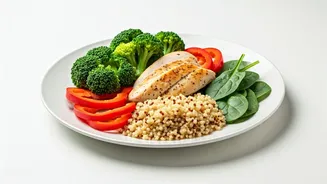Understanding Weight Loss
Weight loss, at its core, revolves around a simple principle: consuming fewer calories than your body expends. This caloric deficit compels the body to
tap into stored fat reserves for energy, resulting in weight reduction. While this fundamental concept appears straightforward, the practical application demands a multifaceted strategy. It involves carefully monitoring dietary intake, understanding the quality of food consumed, and increasing physical activity to boost calorie expenditure. Furthermore, factors like genetics, metabolism, and lifestyle choices can affect the overall process. Creating a sustainable weight loss plan incorporates a holistic approach. It emphasizes not only what you eat, but also the frequency, timing and method of eating, alongside a consistent exercise regime and ensuring sufficient rest. This approach allows a balanced and healthy route for weight loss and enables long-term health benefits, unlike crash diets which can often lead to detrimental health effects.
Nutrition: The Foundation
Nutrition is undoubtedly the bedrock of any successful weight loss endeavor. Focusing on consuming nutrient-dense foods allows for sufficient intake of essential vitamins, minerals, and other vital components, all while keeping calorie counts in check. Embracing a diet abundant in whole foods, such as fruits, vegetables, lean proteins, and whole grains, will naturally provide the body with essential elements. These foods provide sustained energy levels, enhance satiety, and support overall health. Understanding macronutrients—proteins, carbohydrates, and fats—is also important. Proteins assist in building and repairing tissues, carbohydrates offer energy, and healthy fats support vital bodily functions. Balancing these macronutrients appropriately is key. It's not just about what to eat, but also about the portion sizes. Overeating, even of healthy foods, can negate weight loss efforts. By carefully planning meals and practicing mindful eating, individuals can make sure they are in line with their goals. Ultimately, making a shift to prioritize nutrient-dense foods not only supports weight loss, but also has long-term positive effects on overall health and well-being, promoting a healthier lifestyle.
Carbohydrates Explained
Carbohydrates often get a bad reputation in the weight loss journey, but understanding their role is crucial. Carbohydrates are the body's main source of energy, and they come in various forms, from simple sugars to complex starches. Not all carbs are equal. Refined carbohydrates, such as white bread, pasta, and sugary drinks, are quickly digested and can lead to spikes in blood sugar, potentially contributing to weight gain and creating cravings. On the other hand, complex carbohydrates, found in whole grains, vegetables, and fruits, are digested more slowly. They provide sustained energy, fiber, and important nutrients, aiding in satiety. The key is to make smart carbohydrate choices. Focusing on complex carbohydrates while limiting the intake of refined ones will benefit weight loss. Adjusting carbohydrate intake based on activity levels is also important. Those who engage in intense physical activity may need more carbohydrates to fuel their workouts, while sedentary individuals may need to consume fewer. Additionally, managing portion sizes of carbohydrate-rich foods and combining them with protein and healthy fats can help regulate blood sugar levels, keeping hunger at bay. Successfully integrating carbohydrates into a weight-loss plan requires making informed choices, leading to a balance between energy provision and weight management.
Creating a Calorie Deficit
As mentioned before, achieving a calorie deficit is paramount for losing weight. To create this deficit, one must consume fewer calories than the body burns daily. This can be achieved through a combination of dietary adjustments and increased physical activity. To begin, calculating your daily calorie needs is important. This involves considering factors like age, gender, activity level, and metabolic rate. Once you know your required calorie intake to maintain your weight, a reduction of 500-750 calories per day typically results in a weight loss of about 1-2 pounds per week. This reduction can be accomplished by focusing on portion control, choosing lower-calorie foods, and swapping unhealthy snacks for healthier alternatives. Equally important is incorporating regular physical activity into your routine. Exercise not only helps burn more calories, but it also increases metabolism, builds muscle mass, and offers an array of additional health benefits. Finding enjoyable activities is crucial for maintaining consistency, whether it's brisk walking, running, swimming, or strength training. A combined strategy of dietary modifications and exercise provides a sustainable path to creating a calorie deficit. This approach focuses on making gradual, manageable changes that support long-term weight management and overall health.
The Role of Exercise
Exercise plays an essential role in a weight loss journey, adding multiple benefits beyond simply burning calories. Regular physical activity increases the body's energy expenditure, which is crucial for creating a calorie deficit. Furthermore, exercise enhances metabolism. Muscle burns more calories at rest than fat, so building muscle mass through resistance training can boost the body's ability to burn calories throughout the day. The ideal exercise plan involves a mix of cardiovascular exercises and strength training. Cardiovascular activities, such as running, swimming, or cycling, efficiently burn calories and enhance cardiovascular health. Strength training, using weights or bodyweight exercises, builds and preserves muscle mass. Incorporating both types of exercise ensures a balanced approach to weight loss and overall fitness. Consistency is the key to seeing results. Setting realistic goals and establishing a regular workout schedule is essential for staying on track. Finding activities you enjoy can make exercise more sustainable. It can be something as simple as joining a fitness class or going for a hike. Exercising regularly not only helps burn calories and build muscle, but also improves mood, reduces stress, and boosts energy levels. Therefore, exercise is a powerful tool for weight loss and enhances overall health and well-being.
Building Healthy Habits
Successful and sustainable weight loss relies heavily on forming healthy habits. These habits go beyond diet and exercise; they involve a holistic approach to your overall lifestyle. First and foremost, planning meals and snacks in advance can prevent impulsive, unhealthy food choices. Preparing meals at home provides better control over ingredients and portion sizes. Prioritizing sleep is another important aspect. Getting enough sleep helps regulate hormones that control appetite and metabolism. Aiming for seven to nine hours of quality sleep per night can help support weight loss efforts. Staying hydrated is also very crucial. Drinking sufficient water can help boost metabolism, increase satiety, and support overall health. Keeping a food journal or using a mobile app to track your calorie intake and exercise progress can help you stay aware and motivated. This practice helps to assess what areas might need adjustment. Learning to manage stress is also necessary. Chronic stress can cause hormonal imbalances and lead to emotional eating. Practicing relaxation techniques, such as meditation or yoga, can help reduce stress levels. In the end, establishing these healthy habits creates a solid foundation for successful and sustainable weight loss, also promoting overall well-being.















